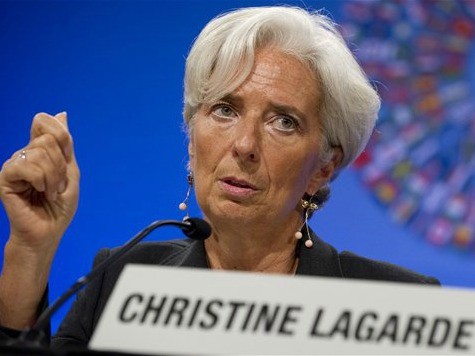Christine Lagarde, managing director of the International Monetary Fund, has ruled herself out of becoming the president of the European Commission.
Speaking in London yesterday at the presentation of the IMF’s annual assessment of the British economy, she said: “On this EU thing, I am not a candidate. I have a job, I happen to think it is a rather important job and I intend to complete my term,” according to an AFP report.
Lagarde’s name was put forward last month by British Conservatives and others who are searching for an alternative to Jean-Claude Juncker, the former prime minister of Luxembourg who is an advocate of turning the EU into a unitary state.
Despite the attempts by the anti-Juncker lobby to whip up support for Lagarde with rumours that she would have wide support in the European Council, Breitbart London reported on May 22 that while “It is clear why the euro-elite would want her to leave the IMF (‘She’s one of us’) and head the commission…the rumours being placed around Brussels don’t say why Lagarde would agree to the move.
“Anyone who has been watching her career manoeuvres must reckon what she wants next is to be president of France, not to be head bureaucrat at the European Commission. That job is okay for small-time former prime ministers from small time countries. The current president José Manuel Barroso was for just two years the prime minister of Portugal, and nothing else you’ve ever heard of.
“But for a global player with her eyes on the Elysée Palace, president of the commission doesn’t obviously figure as a game plan.”
Lagarde knows that despite the commission having the sole power to initiate EU legislation and enforce EU law, the president of the commission is in many ways just a vastly overpaid servant of the heads of state and government who make up the European Council.
In recent years, with the dominance of German Chancellor Merkel, who likes to do deals in negotiations with one or two other key EU leaders, what Brussels calls “intergovernmentalism” has been on the rise, cutting out the commission altogether.
However, intergovernmentalism has on occasion cut out David Cameron and the UK as well, such as in 2012 when Cameron attempted to stop a new EU treaty that would give added powers to Brussels over member states’ national budgets.
At a European Council meeting in Brussels, Cameron said Britain would not agree to it, and he came out to the press conference after the council bragging that he had “vetoed” a treaty.
In fact, all the other member states except the UK and the Czech Republic just went off and agreed a treaty that was technically established between governments, not between EU member states. Now EU institutions operate this treaty, called the Fiscal Compact, as though it were an EU instrument.

COMMENTS
Please let us know if you're having issues with commenting.